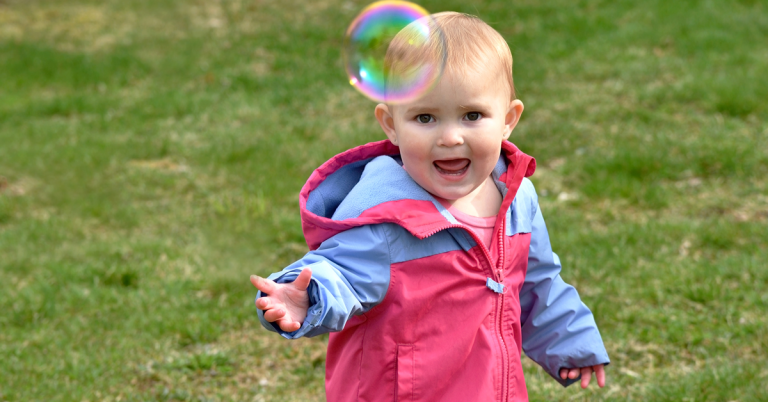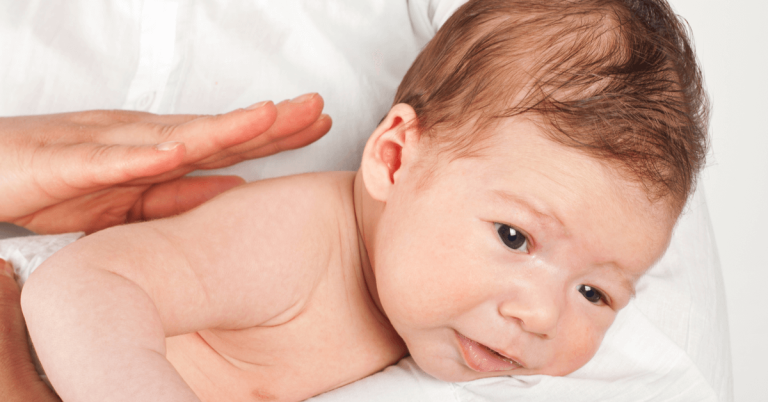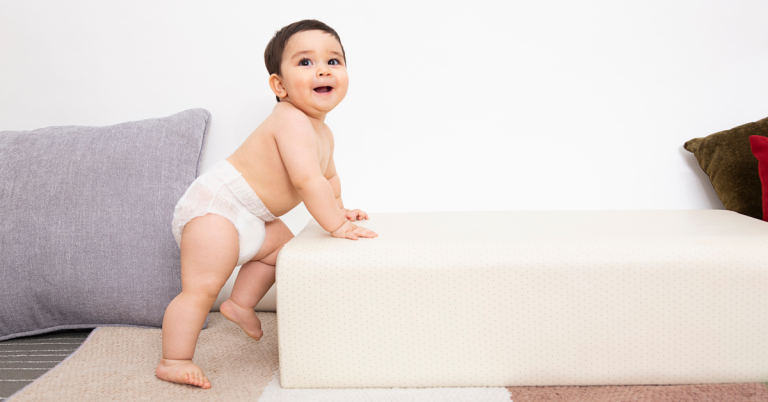Congratulations! There’s only one month left until your baby turns one-and-a-half years old. In our opinion, do not even mention the one month left in response to questions of “How old is your baby.” Now you can finally say: “One-and-a-half.”
We know you do everything you can to ensure your baby’s healthy and happy development. To continue raising your little one with the same dedication, you must know the most important details about seventeen-month-old babies’ development.
What Can My 17-Month-Old Baby Do?
By seventeen months, your little one has quickly grown and learned many important skills. As he enters the seventeenth month, he will further develop these and become an expert in what he does. What can a 17-month-old baby do? What skills does he learn? And how does he feel? How well do we know the answers to these questions? Let’s examine this in detail together.
Measurements and Physical Development at Seventeen Months
During infancy until 24 months, a human being undergoes incredible rapid growth and development. The table below shows 17-month-old babies’ average weight, length, and head circumference.
| Gender | Length (cm) | Weight | Head Circumference |
| Girl | 74.3 cm – 85 cm | 8 kg – 12.7 kg | 43.5 cm – 48.7 cm |
| Boy | 76.3 cm – 86.2 cm | 8.7 kg – 13.2 kg | 44.7 cm – 49.7 cm |
Do not panic if your 17-month-old baby’s weight, height, or head circumference are slightly below or above the limit values. Remember that every child is unique and individual differences are normal at every stage of development. However, if your child’s measurements diverge greatly from these reference values, you should consult a specialised physician.
Psychomotor Development
Psychomotor development can be defined as a baby’s psychological readiness to perform certain motor skills and the mobility he gains. In other words, the child must be physically and psychologically ready to develop certain abilities. The psychomotor skills we expect from a 17-month-old baby are as follows:
- He can easily walk and run and keep his balance. He also loves to crawl on chairs and sofas. He can get on and off the same seat 100 times without getting bored.
- 17-month-old babies love tilting doorknobs and opening and closing doors. Of course, this often takes the form of slamming, and your little one may get his hand or fingers pinched in the door. If your little one is very ardent about slamming doors, buying and installing baby finger pinch guards may be a good idea.
- He can brush his teeth under your supervision with a soft bristle or silicone brush.
- He can easily grasp thick pencils and crayons and draw circles and lines on paper or even on your neatly painted walls. You can give your little one age-appropriate coloured pencils or crayons and allow him to draw on paper or a blackboard. If you wish, you can also set apart a piece of wall for him to scribble on as much as he likes and allow him to perform his artistic activities within those boundaries. Always supervise your baby when working with pencils and crayons, as these may create a choking hazard.
- He can easily reach objects by standing on tiptoe.
- He can tear off gifts’ wrapping paper.
Language Development and Speech
Language development begins at birth and continues for a lifetime. It starts with storing basic sounds in your mind and forms a long process of understanding concepts like colours, symbols, numbers and all other words we use daily.
The sounds he has heard until now are stored in your baby’s mind. He will start remembering these words, putting them together, and forming short sentences. As the number of words that he learns and uses in a sentence gradually increases, he will be able to understand his environment better and express himself more clearly. At seventeen months, your baby may gain the following language skills:
- Can make sentences of 2-3 words.
- Can speak about 35-45 words. The number of words he understands is much more than this.
- May try to repeat words or short phrases you say.
- Imitates melodic sounds. You can sing simple nursery rhymes like Baa baa black sheep, The wheels of the bus or Mary Had a Little Lamb and add some funny movements. It will be a delight to see your little one accompanying the song with you and even repeating the moves.
- Recognises facial organs such as eyes, nose, ears, hands, arms, and legs, and can accurately show at least three when asked.
- Recognises the moon, sun and stars.
- Talk to your little one from the day he is born, regardless of whether he understands you. Describe the things you are doing. “I’m putting on your overalls now.” “Let’s open the curtains.” “Here, I have brought your cup.” Recount your day and chat with him often.
- After a while, you will realise that he recognises the words you use while talking to him, and even though he cannot say the words yet, he points at them with his finger when asked. You can enrich his vocabulary by reading age-appropriate books.
Social and Emotional Development
At seventeen months, your little one is often strong-willed. He also wants to socialise with other adults. You will most probably see a lot of new behaviours:
- Saying no to everything becomes his favourite pastime because he feels independent and thinks he can do whatever he wants. Therefore, it is important to give your baby the feeling that he is in control and to let him make his own decisions as far as possible. For example, if you need him to get dressed, give him two options to choose from so he feels he can decide. If he adamantly wants to eat ice cream when he is ill, offer him a choice of strawberries or bananas instead.
- At seventeen months, separation anxiety can be quite intense and may continue for quite some time until around the age of three. Lying when you leave him or going away without telling him may seem like it works in the short term. However, in the long run, it makes breakups more painful. Tell him in simple and understandable language that you will leave for a while but will be back soon and offer something that will distract him. Keep your goodbyes short, even if your baby cries. Soon, he will turn his attention to his favourite toy. Yes, maybe he’ll be upset that you will be going, but his confidence in you will increase when you speak with him honestly.
- Children typically begin with pretend play between fourteen and eighteen months. He carefully observes and mimics your emotions and actions. When you ask him to look angry, happy, or cry, he will successfully imitate these emotional expressions.
- He prefers playing with adults instead of his peers because he can easily explain what he wants, and they will do what he asks, like clapping, driving the toy car, etc.
- The effects of his socialisation are visible in his games. He may pretend to drink tea while drinking from his toy cup or cough while playing doctor.
Cognitive Development
In addition to your little one’s physical development, his brain development continues rapidly. New nerve cells are formed, and an advanced information network is created by establishing meaningful connections. As this network develops and branches out, your baby’s cognitive abilities become apparent. Let’s examine the key features of a 17-month-old baby’s cognitive development.
- Can come up with solutions for simple problems. For example, he can pull the blanket towards him to reach the toy beyond his reach on the bed. He can use the pillow on the floor as a step to climb onto the sofa.
- Can match different shapes. He can distinguish between a star and a circle and place them in the right slot on the board of his shape sorter toy.
- Can distinguish between large and small objects. He can place toys of different sizes in the correct container.
Sleep at Seventeen Months
Your 17-month-old baby, on average, needs to sleep for thirteen to fourteen hours. Out of this, he will probably nap for one to two hours during the day. Of course, different babies have different rhythms. Some babies nap for three to four hours, while others are content with only half an hour. It is just important that your baby gets a sufficient total amount of sleep each day.
Food Habits and Nutrition
Don’t expect your baby to sit still in his highchair and calmly eat until he has finished his plate. Most babies prefer to eat while playing and wandering around. Therefore, you can include finger foods that he can easily snack on. Foods he can easily grasp and eat on his own will motivate him to stay in his highchair longer.
Teething: Your baby’s teeth appear one by one. If the upper and lower canines and lower and upper first molars of your baby have not appeared yet, they may do so around seventeen months. As the number of teeth grows, your little one’s menu will get richer, he will be able to eat his food more easily, and his self-confidence will increase.
Play at Seventeen Months
If you want your baby to have a happy and healthy development, accompany him through play. Grow together, get involved in the learning process and play games together. Remember that children learn best when they play. You can enjoy pure happiness at seventeen months by playing the following games with your sweetie. In this way, you will contribute to the development of your little one in many ways and strengthen the emotional bond between you.
- Geometric shape sorter toys
One of the toys that 17-month-old babies enjoy most are shape sorter toys made of plastic or wood. They have different geometric shapes like a star, square, heart, oval, triangle etc. and your baby places the shape in the correct slot. You can also use kitchen utensils, like plastic containers with lids that can be opened and closed easily.
These toys improve your baby’s problem-solving skills as well as hand-eye coordination. He develops the muscles of his hands and fingers as he grasps the shapes and struggles to put them in place. Whenever he can place an object in the right slot, he experiences the happiness of success.
- Matryoshkas
You can play a matching game with matryoshkas or nested containers. Your baby learns about different sizes by grasping and nesting. When he can nest the items with the right dimensions, he experiences going from the part to the whole and experiences the pleasure of success.
- Catch the toy on the table
Place your kid’s favourite toy on a table so that he can see it and place it just out of reach. Place a stable stool nearby that he can easily climb on. Make sure that nothing on the floor could hurt him if he falls, and do not leave him alone during the game.
- Unpack
A 17-month-old baby loves opening packages and tearing wrappers. Therefore, wrap his favourite toys in coloured paper or aluminium foil. Then put the “presents” in front of him to open and give the necessary instructions. This activity will train your little one’s hand and finger muscles and stimulate his vision through the perception of colours and hearing through the sound of tearing wrappers.
- One thousand faces
Use a piece of cardboard, a book or opaque fabric to cover your face. Every time you reveal your face, express a different emotion, happy, sad, angry, sleepy, scared, confused, etc. Don’t be hasty and let your baby watch long enough before closing the curtain and moving on to the next expression. You can also name them. After playing for a while, ask your baby to make the same expressions now.
To effectively support your baby’s growth and development, you must first know a 17-month-old’s cognitive, social, emotional, and physical milestones. Then you can purposefully determine his needs and enjoy a pleasant month with your baby.
Shopping advice – What to buy?
Babies love shape sorter toys and nesting containers or Matryoshkas at seventeen months. If you notice your baby is teething, teether toys and teething gels can be very useful to help decrease the discomfort. Brushing your baby’s teeth from the moment they appear is very important. Buy a soft bristle or silicone brush, a tasty baby toothpaste and a colourful cup to make this moment more fun. And if your baby is a little wanderer while eating, allowing him to eat at a separate weaning table with a chair may come in handy next to his highchair. Please look at our website, read other parents’ reviews and buy the items of your choice at affordable prices at ebebek.
It’s Your Turn Now – Write a Comment
How are you raising your fifteen-month-old baby? What challenges did you experience this month? How did you overcome them? We welcome your comments to support and inspire other caregivers.
Don’t Forget to Share!
Don’t forget to share our fifteen-month-old baby development article so other caregivers and expectant parents can read and learn!







